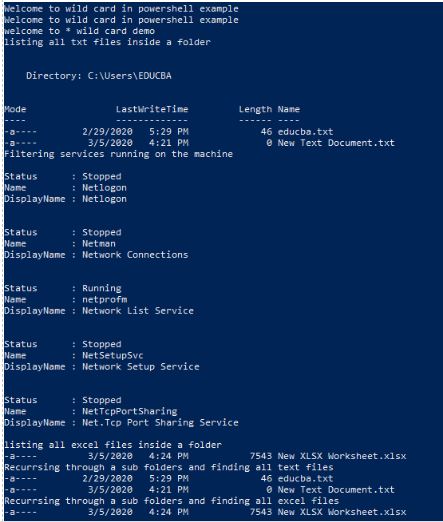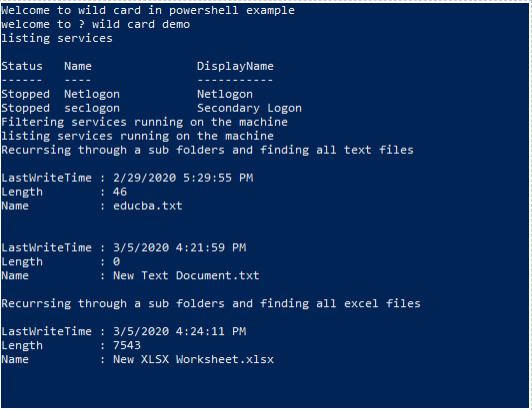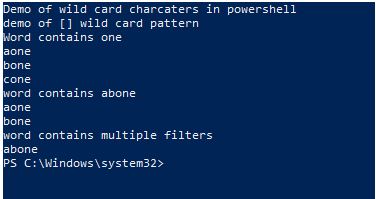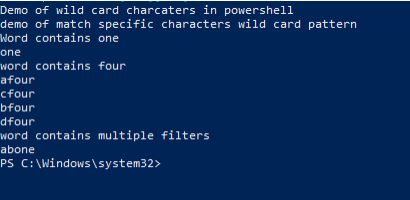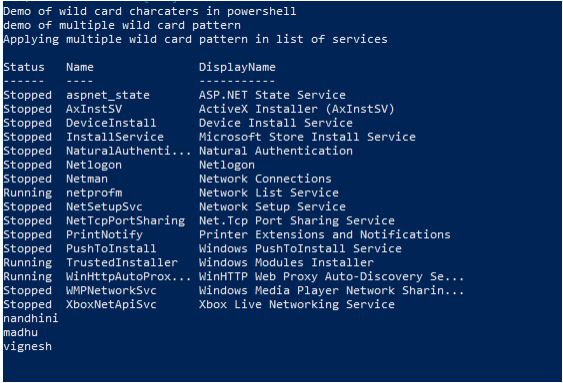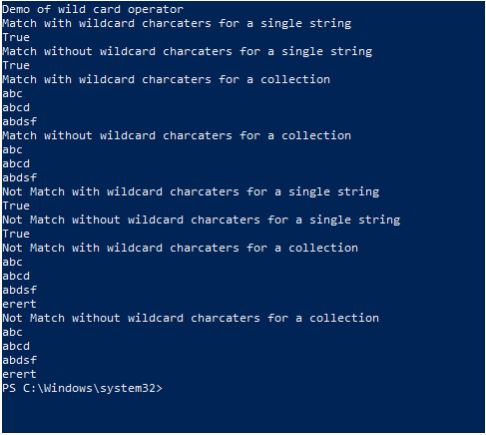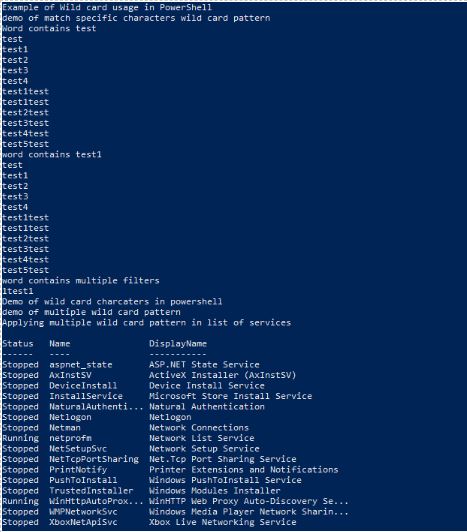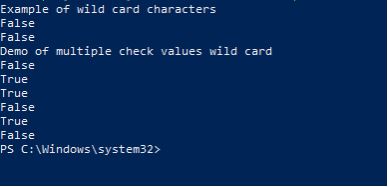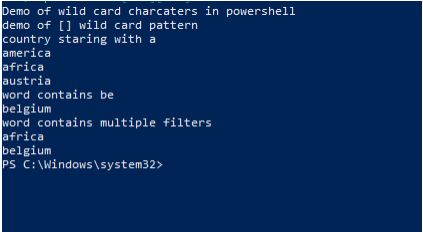Updated February 28, 2023

Introduction to PowerShell Wildcards
Wildcards are patterns that are used to match multiple characters. They are used to specify certain patterns in the cmdlets to filter the results or return only the results that matches the wild card specified. There are four types of wild cards that are available in PowerShell. They are represented as *, ?, [m-n] and [abc]. More than one wildcard pattern can be used together. Wildcard parameters are accepted by many cmdlets in PowerShell. Cmdlets that accepts wild card characters as input are case insensitive. Wildcards can also be used in a cmdlet to filter properties that are available in the cmdlet results. This article will cover in detail about wildcards, their types, their usage along with various examples.
Types of Wildcard in PowerShell
There are four types of wildcards that are available in PowerShell.
Syntax:
1) *: It denotes that the matching pattern must be zero or more characters. If only * is used, then all the matching characters are returned.
Example: Ba* it will return bagubali, batcha, basel. It won’t return like America, Africa.
2) ?: It denotes that a character at the position must be matched.
Example: ?b will return ab, cb,db and won’t return aa,ac,aj.
3) []: This denotes that a pattern within the range must be checked for matching.
Example: [a-c]de will return ade, bde and won’t match with zde.
4) []: It matches only the specific characters mentioned in the range.
Example: [ab]tef will match with atef and btef.
Examples to Implement PowerShell Wildcards
Below are the examples of PowerShell Wildcards:
Example #1
Code:
Write-Host "Welcome to wild card in powershell example"
Write-Host "Welcome to wild card in powershell example"
Write-Host "welcome to * wild card demo"
Write-Host "listing all txt files inside a folder"
Get-ChildItem C:\Users\EDUCBA\*.txt
write-host "Filtering services running on the machine"
Get-Service | Where-Object {$_.Name -like "net*"}
Write-Host "listing all excel files inside a folder"
Get-ChildItem C:\Users\EDUCBA\*.xlsx
Write-Host "Recurrsing through a sub folders and finding all text files"
Get-ChildItem -Path C:\\Users\EDUCBA\*.txt -Recurse -Force
Write-Host "Recurrsing through a sub folders and finding all excel files"
Get-ChildItem -Path C:\\Users\EDUCBA\*.xlsx -Recurse -Force
Output:
Example #2
Code:
Write-Host "Welcome to wild card in powershell example"
Write-Host "welcome to ? wild card demo"
Write-Host "listing services"
Get-Service | Where-Object {$_.Name -like "???logon"}
write-host "Filtering services running on the machine"
Get-Service | Where-Object {$_.Name -like "??logon"}
write-host "listing services running on the machine"
Get-Service | Where-Object {$_.Name -like "?logon"}
Write-Host "Recurrsing through a sub folders and finding all text files"
Get-ChildItem -Path C:\\Users\EDUCBA\*.txt -Recurse -Force
Write-Host "Recurrsing through a sub folders and finding all excel files"
Get-ChildItem -Path C:\\Users\EDUCBA\*.xlsx -Recurse -Force
Output:
Example #3
Code:
Write-Host "Demo of wild card charcaters in powershell"
Write-Host "demo of [] wild card pattern"
$input=@("one","two","three","four","five","oneone","onetwo","onethree","aone","bone","cone")
Write-Host "Word contains one"
$input -like "[a-z]one"
$input=@("abone","two","three","abfour","five","aboneone","onetwo","onethree","aone","bone","abonethree")
Write-Host "word contains abone"
$input -like "[ab]one"
$input=@("abone","two","three","abfour","five","aboneone","onetwo","onethree","aone","bone","abonethree")
Write-Host "word contains multiple filters"
$input -like "[a-d][b-f]one"
Output:
Example #4
Code:
Write-Host "Demo of wild card charcaters in powershell"
Write-Host "demo of match specific characters wild card pattern"
$input=@("one","two","three","four","five","oneone","onetwo","onethree","aone","bone","cone")
Write-Host "Word contains one"
$input -like "[o]ne"
$input=@("abone","two","three","afour","five","aboneone","onetwo","onethree","aone","bone","abonethree","cfour","bfour","dfour")
Write-Host "word contains four"
$input -like "[abcd]four"
$input=@("abone","two","three","abfour","five","aboneone","onetwo","onethree","aone","bone","abonethree")
Write-Host "word contains multiple filters"
$input -like "[a-d][b-f]one"
Output:
Example #5
Code:
Write-Host "Demo of wild card charcaters in powershell"
Write-Host "demo of multiple wild card pattern"
Write-Host "Applying multiple wild card pattern in list of services"
Get-Service | Where-Object {$_.Name -like "*n?t*"}
$inout=@("vignesh","nandhini","vyapini","ashiwini","hini","madhu")
$inout -like "[a-z][a-d]*"
$inout=@("vignesh","nandhini","vyapini","ashiwini","hini","madhu")
$inout -like "*ne[s-z]?o*"
$inout=@("vignesh","nandhini","vyapini","ashiwini","hini","madhu")
$inout -like "*ne[s-z]?"
Output:
Example #6
Code:
write-host "Demo of wild card operator"
Write-Host "Match with wildcard charcaters for a single string"
$input="My name is ramesh"
$input -match "na*"
Write-Host "Match without wildcard charcaters for a single string"
$input -match "na"
Write-Host "Match with wildcard charcaters for a collection"
$input="abc", "abcd", "abdsf","erert"
$input -match "ab*"
Write-Host "Match without wildcard charcaters for a collection"
$input="abc", "abcd", "abdsf","erert"
$input -match "ab"
Write-Host "Not Match with wildcard charcaters for a single string"
$input="My name is sacinn tendulkar"
$input -notmatch "za*?"
Write-Host "Not Match without wildcard charcaters for a single string"
$input -notmatch "za"
Write-Host "Not Match with wildcard charcaters for a collection"
$input="abc", "abcd", "abdsf","erert"
$input -notmatch "za[-z]*"
Write-Host "Not Match without wildcard charcaters for a collection"
$input="abc", "abcd", "abdsf","erert"
$input -notmatch "za[u]"
Output:
Example #7
Code:
Write-Host "Example of Wild card usage in PowerShell"
Write-Host "demo of match specific characters wild card pattern"
$input=@("test","test1","test2","test3","test4","test1test","test1test","test2test","test3test","test4test","test5test")
Write-Host "Word contains test"
$input -like "[t]est*"
$input=@("test","test1","test2","test3","test4","test1test","test1test","test2test","test3test","test4test","test5test")
Write-Host "word contains test1"
$input -like "test*"
$input=@("test","1test1","test2","test3","test4","test1test","test1test","test2test","test3test","test4test","test5test")
Write-Host "word contains multiple filters"
$input -like "?test1"
Write-Host "Demo of wild card charcaters in powershell"
Write-Host "demo of multiple wild card pattern"
Write-Host "Applying multiple wild card pattern in list of services"
Get-Service | Where-Object {$_.Name -like "*n?t*"}
$inout=@("test","test1","test2","test3","test4","test1test","test1test","test2test","test3test","test4test","test5test")
$inout -like "[a-z][a-d]*"
$inout=@("test","test1","test2","test3","test4","test1test","test1test","test2test","test3test","test4test","test5test")
$inout -like "*ne[s-z]?o*"
$inout=@("test","test1","test2","test3","test4","test1test","test1test","test2test","test3test","test4test","test5test")
$inout -like "*ne[s-z]?"
Output:
Example #8
Code:
Write-Host "Example of wild card characters"
$input= "sdfsdfdsf","adsadsad","test","test1"
$input -contains "test*"
$input= "sdfsdfdsf","adsadsad","test","test1"
$input -contains "dfsdf?*"
Write-Host "Demo of multiple check values wild card"
$input="one","two","three","four","five"
$input -contains "one?","two*"
$input="one","two"
$input, "three","four" -ccontains $input
$input= "sdfsdfdsf","adsadsad","dfdf","sdf"
$input -notcontains "test"
$input= "sdfsdfdsf","adsadsad","test","test1"
$input -notcontains "test"
$input="one","two","three","four","five"
$input -notcontains "one","two"
$input="one","two"
$input, "three","four" -notcontains $input
Output:
Example #9
Code:
Write-Host "Demo of wild card charcaters in powershell"
Write-Host "demo of [] wild card pattern"
$input=@("india","china","america","africa","thailand","sweden","germany","poland","austria","belgium","srilanka")
Write-Host "country staring with a"
$input -like "a*"
$input=@("india","china","america","africa","thailand","sweden","germany","poland","austria","belgium","srilanka")
Write-Host "word contains be"
$input -like "be*"
$input=@("india","china","america","africa","thailand","sweden","germany","poland","austria","belgium","srilanka")
Write-Host "word contains multiple filters"
$input -like "[a-d][b-f]*"
Output:
Conclusion
Thus, the article covered in detail about wild card expressions in PowerShell. It also explained about the types of wild card expressions that are available and their usage with appropriate examples. The article explained in detail about each wild card expression type with corresponding sample programs. Using Multiple wild card expressions together is also explained in detail along with an appropriate demo program. To learn more in detail, it is advisable to write and practice sample programs.
Recommended Articles
This is a guide to PowerShell Wildcards. Here we discuss the different types of Wildcard in PowerShell and its Examples along with its Code Implementation. You can also go through our other suggested articles to learn more –
